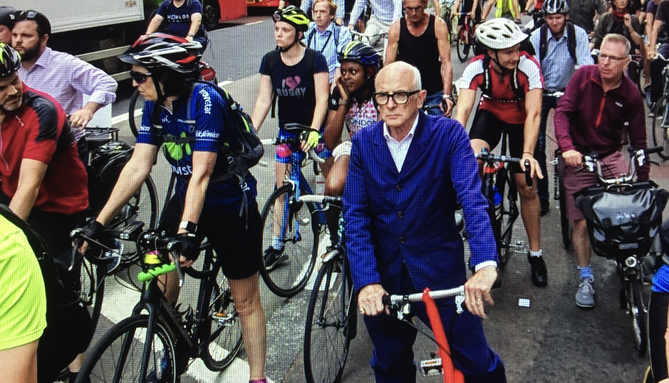 Cyclists in Bank Junction protest at the death of Ying Tao, killed by a construction vehicle Cyclists in Bank Junction protest at the death of Ying Tao, killed by a construction vehicle When London planning consultant Francis Golding was killed by a left-turning coach while cycling home in November 2013, a group of friends and business associates got together to see what they could do to improve cycling conditions in the capital. In that dreadful month six cyclists were killed on London’s streets and it became clear, as the group studied the statistics, that construction industry vehicles were responsible for a disproportionate number of fatalities. So the group decided to focus on their own area of business - development and construction - to see specifically what could be done to help the industry improve its dire record. So the Construction Industry Cycling Commission was set up; chairman of the group was Mike Hussey, CEO of Developers Almacantar. Mike had been involved with Francis on the planning of the Walkie Talkie tower in the City of London. Other members included Michael McGee of the McGee Group, who are contractors with a large fleet on lorries, as well as architects, planners and contractors. Momentum for the Commission built up with the deaths of Claire Hitier-Abadie and Moira Gemmill in 2015, both involved with the industry and both killed by construction vehicles. Early discussions of this rather disparate group made it clear that it needed to have some sound information on which it could base any future work. So it commissioned research from Phil Jones Associates and TMS, a company specialising in road safety and traffic management, to try and find out why the building industry was doing so badly and what could be done to improve the situation. The research figures revealed that whilst HGVs account for only 3.5% of traffic across London, they are involved in 57% of crashes in which a cyclist has been killed (2007 – 2014). It found that 76% of collisions occurred at junctions, 62% of cycle fatalities at traffic signals involve large vehicles turning left or moving off, with most cyclists being struck by the front or nearside of the vehicle. Many fatalities involve HGVs in the construction industry. The research team organised workshops with industry representative to ascertain how best to respond to the findings. As a result a ten point manifesto was agreed: 1 For all property developers and contractors to recognise that health and safety on the road is as important as it is on site 2 For cycle safety to be recognised as part of the Considerate Constructors’ accreditation, ensuring that all lorries used on sites have the requisite safety features, and that drivers are properly trained 3 For the industry – large and small organisations – to adopt the CLOCS standard as a default requirement on all construction schemes in London and other major cities, and wherever significant interaction between HGVs and cyclists can be expected 4 For investment in safer vehicles to be made ahead of regulation, such as direct vision cabs, skirts, and specific safety standards and equipment 5 For the construction industry to fast-track discussion and action around changes to vehicle safety, which might include the retrofitting of older vehicles and retiming of journeys to avoid morning peak hours 6 For design professionals to be better trained in the design and planning of safer environments for vulnerable road users 7 For property developers to use hoarding and wraps of new developments to deploy helpful safety advice for cyclists and drivers 8 For the construction industry to support training for all road users 9 For the construction industry to support the campaign for greater separation between cyclists and HGVs in time and/or space at junctions and on links, and helping to disseminate information on primary routes used by HGVs 10 For the construction industry to support more detailed research to understand the circumstances surrounding lorry/cyclist collisions to identify the root cause of injuries, fatalities and near misses “The level of cycling accidents in the UK is simply unacceptable.” says Mike Hussey. “The CICC’s manifesto for change sets out clear ways we can improve cycle safety. As an industry, we have an obligation to improve the dangerous conditions cyclists face, so I urge our peers to join us and commit to our recommendations.” The Commission will now be pressing professional institutions, companies and consultancies to sign up to the manifesto.
1 Comment
|
Archives
October 2020
Categories |

 RSS Feed
RSS Feed